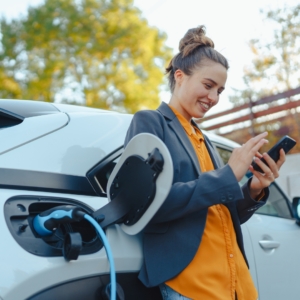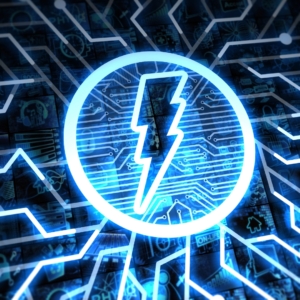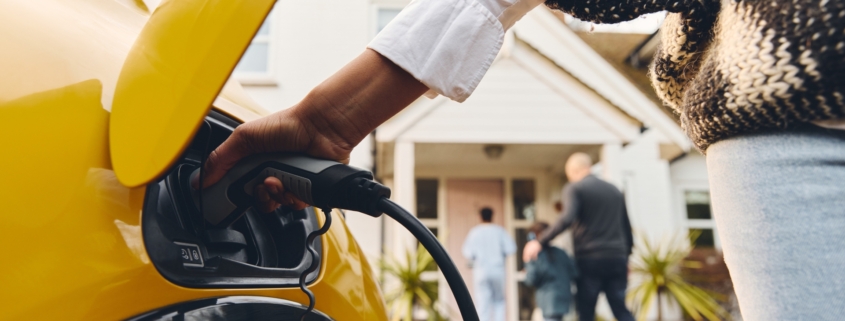Can Your EV Power Your House?
In 2025, more and more homeowners are looking at their electric vehicles (EVs) as a potential backup power source. Some EVs already have the ability to act as a power source for your home through a feature called Vehicle-to-Home (V2H) charging. This lets your EV temporarily supply power during an outage or when you need extra energy.
While only a few EV models offer V2H right now, many upcoming models are expected to include this cool feature. The best part? Electrical contractors can install this system as a cost-effective alternative to purchasing an expensive battery or generator.
If you’re considering using your EV in this way, you’ll need a licensed electrician to help connect everything safely and correctly. It’s important to work with a professional to ensure the system is installed properly, so your home stays powered when you need it most.

Understanding Bidirectional Charging
In the past, EV charging has been purely one-directional. Alternating current (AC) electricity is sent to a car’s battery from an EV charging station or outlet and converted into direct current (DC) energy. In bidirectional charging, an EV can convert DC energy to AC electricity to be used in different ways.
Bidirectional charging allows EVs to both charge and discharge electricity. The EV’s stored power can be a backup generator for a home during an outage.
The benefits of bidirectional charging technology include:
- Lowering your energy bill
- Sending electricity back to a utility network
- Powering a home during an outage
Vehicle-to-Grid (V2G) vs. Vehicle-to-Home (V2H)
Vehicle-to-Grid (V2G) charging enables EV owners to send energy back to the utility grid, like homeowners with solar panels. V2G supports grid stability by returning stored energy to the power grid. Not to mention, EV owners who return energy to the grid also get paid for their efforts to improve grid reliability.
Vehicle-to-Home (V2H) charging allows EV owners to send stored energy to their home’s electrical system. This is extremely valuable because V2H can power a home during an outage. On average, EV batteries hold 69.5 kilowatt hours when fully charged, providing backup power to a home for two days. With V2H charging capabilities, homeowners can save on the cost of a generator.
The key difference between V2G and V2H charging lies in where energy flows.
V2G → Energy flows to the electrical grid.
V2H → Energy flows to a home’s electrical circuits.
The Potential of Using EVs as Backup Power for Homes
Certain EV models offer V2H capabilities that direct power from their battery to a home’s electrical system. Using EVs as alternatives to supply power to homes during outages provides benefits, including:
- Silent operation. Gasoline generators can be disruptive with their loud operational noises. Using an EV to power your home during an outage diminishes the noise associated with traditional generators.
- No need for fuel storage. With V2H, homeowners don’t have to worry about storing fuel to refill generators. This eliminates the safety hazards of fuel handling and offers convenience.
- Potential cost savings. Homeowners can even reap cost savings by using energy collected during off-peak hours to save on electricity.
- Greater power capacity. Generally, EV batteries are much larger than backup battery systems, meaning they can supply power to a home for longer.
Wondering which EV models offer V2H capabilities? Check out the list of current models from Cars.com.
Have Questions? Here’s How Electricians Can Help
Electricians play a key role in installing V2H (Vehicle-to-Home) systems at EV owners’ homes. The installation isn’t straightforward and can differ depending on local regulations, which is why having a licensed professional is essential.
They can help homeowners successfully connect the bidirectional charger to their energy panel, unlocking the full potential of this new technology. V2H systems offer an efficient, cost-saving alternative to traditional backup power options like generators.
Connect with a PPNW Electrical Professional
Unlock the benefits of V2H by connecting with a Powering Pacific Northwest electrical professional. Our licensed and bonded experts can handle all home electrical needs, from electrical troubleshooting to V2H charging system installation. Step into the future of backup power with V2H and bidirectional charging.
Find a contractor today.



